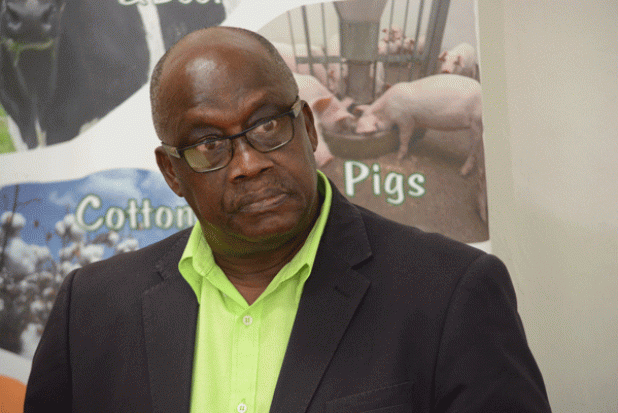
Chief Executive Officer of the Barbados Agricultural Society (BAS), James Paul.
Options needed
With the fluctuating price of corn on the international market, the local farming community is wary of the impact such prices may have on their ability to keep meat prices stable, and Chief Executive Officer of the Barbados Agricultural Society (BAS), James Paul says alternative options are needed.
Paul is making the case for larger countries within CARICOM such as Guyana and Suriname to grow corn for the wider region, as a means of ensuring ready supply and at cheaper prices, instead of importing such grains from extra regional sources. Last week corn prices jumped to US $6.60 per bushel and as of July 16, it was US $5.56 per bushel, much higher than the average closing price of the US $3.8544 and US $3.6393 recorded in 2019 and 2020 respectively.
Paul said while the price of corn over the last few years has been relatively stable, it has been known to rise on occasion and he insists that the time may come when the prices rise and do not go back down, which could drive feed prices up and ultimately the cost of meat. He added that while Government has provided support that allows the lone feed manufacturer to hold the price of feed, this is not a long term solution. Instead, he suggested one solution is for the larger island nations to produce corn on a commercial basis for the region to use in feed production, another he said, is cassava as an alternative to corn.
The BAS’ CEO said that the opportunity still exists for cassava to be used as an input in feed production, but he stated that tremendous research is needed to make it a viable venture. He explained that a few years ago a Columbian company examined the feasibility of using cassava for feed and the prospects looked good, but he said, the main issue would be cassava supply.
“To do that we would have to immediately try to increase overall production of cassava, in order to ensure that we are able to get enough to satisfy the need for the cassava that could be incorporated into commercial feed. The other thing, of course, is that partnerships are necessary because to use cassava in commercial feed we cannot do it in absence of the buy-in of the farmers of the lone feed company that we have on the island. I know in the past this was discussed with the feed company, and they have expressed some willingness to cooperate in that regard, but the process needs funding and further research,” he stated.
Paul suggested that with large amounts of land on the island sitting idle, there is scope to increase the quantity of cassava being grown locally, but he explained that farmers would have to be willing to get on board. He explained that feed-grade cassava stays in the ground longer and sells at a lower price than food-grade cassava.
“Farmers might question why they should leave that cassava in the ground for eight or nine months, when in four or five months they are able to get it out and get money for it. And then there is also the concern about praedial larceny when they have to leave the cassava in the ground twice as long. So these are the challenges that we face and so the acreage of the cassava would have to be so significant, that first of all, there will always be enough cassava to satisfy consumers’ needs for food-grade cassava, but at the same time, you've got enough left back that can go into that feed manufacturing,” he stated.
Reiterating the need for more research to be done in this area, Paul said attention also needed to be paid to forage production.
“If we can produce more forage consistently and of good quality, it will help of course to reduce the amount of concentrate farmers have to use. This is especially important in dairy farming. I think the hay producers need backup in terms of research, but we don't have that type of research capacity here and that is what we have to try to build. We must build out research capacity that would help business sectors like the agriculture sector to be able to produce products that are consistent, reliable and competitive,” he stated. (JRT)
